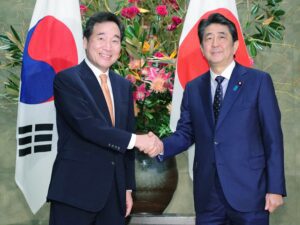Japan-South Korea Relationship
Context:
Since the relations have been strained amid Japan’s refusal to apologise for its occupation of Korea, Fumio Kishida is the first Japanese prime minister to visit Seoul in 12 years. But because of worries about China and North Korea, both nations have unified.
Points to Ponder:
- The first Japanese prime minister to travel to Seoul in 12 years was Fumio Kishida of Japan.
- This tour tries to strengthen ties between the two U.S. allies, which have been strained over historical disagreements, along with South Korean President Yoon Suk Yeol’s travel to Japan in March.
- Concerns about North Korea’s nuclear development and China’s regional hegemony have brought the two nations together.
- By calling for going forward despite historical disagreements, President Yoon faced domestic political backlash.
- The creation of a fund to compensate South Koreans who suffered as a result of Japanese forced labour programmes was agreed upon by both parties in March. Instead of Japanese businesses, a shared fund will be responsible for paying the reparations.
- Despite the support of both leaders, there are still obstacles because of history.
- Many people in South Korea continue to wait for Japan to officially apologise for the crimes committed during its occupation. Japan has been reticent to do so.
- Due to domestic political factors—including the fact that some Japanese conservatives continue to reject the crimes committed during the war—Japanese leaders have been reluctant to accept reparations or more thorough apologies.
- Both parties have been exploring deeper defence and commercial relations during the visit, and the Japanese leader extended an invitation to Mr Yoon to the G-7 Summit, which will take held in Tokyo later this month.
History
- Japan’s rule of the Korean peninsula from 1910 to 1945 left deep historical wounds that are at the heart of the current trade and political conflict between South Korea and Japan.
- Atrocities done by Japan during this period dd in Korea, such as the exploitation of forced labour and the problem of “comfort women,” have prompted demands for restitution.
- South Korea is requesting from Japan what they see as just reparations for these atrocities.
- Japan maintains that the issue has been resolved by the 1965 treaty that established diplomatic ties and offered financial assistance.
- However, the 1965 agreement removed residents’ rights to demand reparations and did not completely resolve all of the issues connected to their colonial heritage.
- Activists continue to disagree with Japan’s apologies and financial commitments, and the topic is still divisive.
- In 2015, Japan apologized and promised to pay 1bn yen to fund victims of the “comfort women” issue, but activists say they were not consulted and rejected the deal.
- President Moon Jae-in, elected in 2017, suggested altering the deal.
- As two of the world’s largest economies and giants in technology, the tit-for-tat dispute between Japan and South Korea has global implications.
- Trade restrictions and boycotts as a result of the prolonged conflict have hurt businesses in both nations and disrupted international supply networks.
- Since Japan and South Korea are important allies of the United States in the Asia-Pacific region, the issue also has an impact on regional security.





